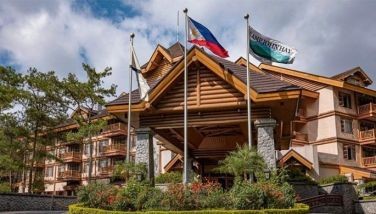SPCPD phaseout feared to complicate South security problems
December 11, 2001 | 12:00am
COTABATO CITY — Security problems in many flashpoints in the South are feared to complicate after the Southern Philippines Council for Peace and Development (SPCPD) has fully shut down following the completion of its role as a transitory mechanism for the expansion of Muslim autonomy.
Lowly members of the Moro National Liberation Front in far-flung areas blame former Autonomous Region in Muslim Mindanao Gov. Nur Misuari for mismanaging the SPCPD, thus resulting in its failure to fully accomplish — even before the termination of the council’s term — its supposed objective of rehabilitating communities where MNLF members are scattered.
The SPCPD, which has started deactivating after the Nov. 26 ARMM polls, was the conduit of foreign donors to poor communities in areas covered by the Sept. 2, 1996 peace agreement between the government and the Moro National Liberation Front.
Dozens of foreign-funded projects for MNLF communities are still ongoing and beneficiaries are worried of a backlash in their implementation with the absence of a set-up, such as the SPCPD, which can directly address the concerns in their communities.
Most of these projects also involve members of the Moro Islamic Liberation Front (MILF) residing in areas covered by the GRP-MNLF peace pact.
Alano Bansawan, chair of the MNLF’s Central Kutawato State revolutionary committee, said while they are aware that the SPCPD will be phased out after it has accomplished its role in helping Malacañang oversee the plebiscite for expanded autonomy, its involvement in rehabilitation projects in war-torn areas has become indispensable in furthering the peace pact.
"What we need now is perhaps another set-up, created by Malacañang and not necessarily a replica of the SPCPD, to serve as the direct channel of our people to the national government," seconded Dima Ambil, the MNLF’s highest official in North Cotabato.
The Council of 15, the MNLF’s new central leadership, has proposed the creation by Malacañang of a special entity, the "Office for SZOPAD Concerns," to continue assisting poor MNLF communities. SZOPAD, or Special Zone of Peace and Development, groups the 10 cities and 14 provinces covered by the GRP-MNLF peace agreement.
Peace advocates in Central Mindanao are in favor of the MNLF’s proposal.
Various sectors in the ARMM are worried of the possible implications to the peace process if livelihood projects for MNLF and MILF members are beset with contraints by the absence of an office to oversee them.
Lowly members of the Moro National Liberation Front in far-flung areas blame former Autonomous Region in Muslim Mindanao Gov. Nur Misuari for mismanaging the SPCPD, thus resulting in its failure to fully accomplish — even before the termination of the council’s term — its supposed objective of rehabilitating communities where MNLF members are scattered.
The SPCPD, which has started deactivating after the Nov. 26 ARMM polls, was the conduit of foreign donors to poor communities in areas covered by the Sept. 2, 1996 peace agreement between the government and the Moro National Liberation Front.
Dozens of foreign-funded projects for MNLF communities are still ongoing and beneficiaries are worried of a backlash in their implementation with the absence of a set-up, such as the SPCPD, which can directly address the concerns in their communities.
Most of these projects also involve members of the Moro Islamic Liberation Front (MILF) residing in areas covered by the GRP-MNLF peace pact.
Alano Bansawan, chair of the MNLF’s Central Kutawato State revolutionary committee, said while they are aware that the SPCPD will be phased out after it has accomplished its role in helping Malacañang oversee the plebiscite for expanded autonomy, its involvement in rehabilitation projects in war-torn areas has become indispensable in furthering the peace pact.
"What we need now is perhaps another set-up, created by Malacañang and not necessarily a replica of the SPCPD, to serve as the direct channel of our people to the national government," seconded Dima Ambil, the MNLF’s highest official in North Cotabato.
The Council of 15, the MNLF’s new central leadership, has proposed the creation by Malacañang of a special entity, the "Office for SZOPAD Concerns," to continue assisting poor MNLF communities. SZOPAD, or Special Zone of Peace and Development, groups the 10 cities and 14 provinces covered by the GRP-MNLF peace agreement.
Peace advocates in Central Mindanao are in favor of the MNLF’s proposal.
Various sectors in the ARMM are worried of the possible implications to the peace process if livelihood projects for MNLF and MILF members are beset with contraints by the absence of an office to oversee them.
BrandSpace Articles
<
>
- Latest
- Trending
Trending
Latest
Trending
Latest
Recommended































